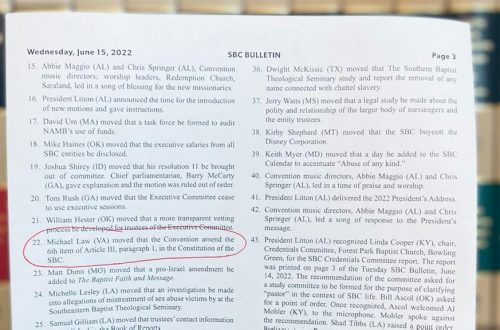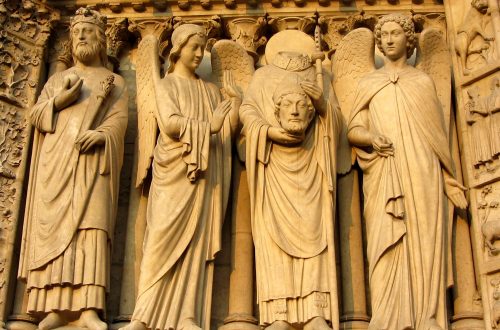Executive Committee member Russ Barksdale published an article this morning explaining why he intends to vote against the Law Amendment next month at the annual meeting of the Southern Baptist Convention (SBC). He argues that the New Testament allows women to serve as pastors in local churches. He contends that female pastors rightly function as shepherds over the men in the church and even over male leaders in the church. He writes:
Does a woman who is leading a children’s ministry “pastor” (verb poimaino) the children? Absolutely! Does she shepherd (verb poimaino) the parents, including the fathers? Absolutely! Does she pastor/shepherd (verb poimaino) the leaders, including the adult males, for instance, when she visits them in the hospital or instructs them from Scripture in leader’s meetings? Absolutely! Isn’t she carrying out the function of pastoring (verb poimaino) without holding the office?
Barksdale contends that the NT allows women to be pastors—including both leading and teaching men in the church—so long as these women aren’t holding the office of elder/overseer. He denies that the noun pastor appears as an office in the New Testament but rather is a “function” that can be carried out by both men and women. Therefore, to exclude churches from friendly cooperation just because they have female pastors is unbiblical. And for that reason he plans to vote against the Law Amendment.
At this point in the debate about the Law Amendment, there really aren’t any new arguments being made against the amendment. We are seeing the recycling of old arguments that have already been refuted, and Barksdale’s article is no different. Barksdale’s argument in favor of female pastors is basically identical to the one that Saddleback Church’s pastor made a year ago before the convention in New Orleans. It was an argument that the messengers overwhelmingly rejected when they voted to reject Saddleback’s appeal to remain in the SBC.
Barksdale’s argument also follows the same line of interpretation spearheaded by Harold Hoehner and later picked up by Sam Storms, which I responded to about five years ago here. There is nothing new under the sun, but for the sake of those just tuning in, it might be helpful to respond to these arguments once again.
Misunderstanding the BF&M
Barksdale contends that the BF&M does not limit the word “pastor” to an office. On the contrary, “pastor” can refer to a ministry function that is open to both men and women. He writes:
I have always considered the language of the BFM to mean that the office itself was reserved for a male, not the specific title. Until the advent of the Law Amendment, I never once thought “pastor” was a title reserved only for the officeholder, only that the office itself, regardless of title, was reserved for a man. Last year’s amendment to Article VI of the BFM, to include all three words (pastor/elder/overseer) makes it clearer that the office is what is reserved for godly males. In my view, a woman who has the title of pastor but is not considered an elder or overseer does not violate the BFM.
According to Barksdale even though the BF&M uses the word pastor to refer to the one office of leadership, churches are free to use that term for people who don’t hold the office. Why? Because the New Testament does not treat the word pastor to refer to the same office as elder/overseer.
In this way, Barksdale’s argument is an ecclesiological misunderstanding before it is a gender misunderstanding. He is simply disagreeing with what the BF&M and other Southern Baptist confessions say about the one office of leadership in the New Testament.
Southern Baptists have consistently confessed that pastor/elder/overseer are three ways of referring to the one of leadership in the church. In short, all three terms name the office. This becomes really clear when you look at the two major revisions to our statement of faith since its original publication in 1925. The chart below shows the relevant excerpts from the original BF&M and its two subsequent revisions. All three of them explain what the “scriptural officers” of the church are.
| BF&M (1925) | BF&M (1963) | BF&M (2000) |
| “Its Scriptural officers are bishops, or elders, and deacons.” | “Its Scriptural officers are pastors and deacons.” | “Its scriptural officers are pastors and deacons.
While both men and women are gifted for service in the church, the office of pastor is limited to men as qualified by Scripture.” |
Notice that the original 1925 version identifies two offices: bishop/elder and deacon. Notice also that the 1963 edition changes “bishops or elders” to “pastors.” Does this change in wording reflect a change in beliefs among Southern Baptists about the scriptural officers of the church? The answer to that question is clearly “no.” We know this to be the case because messengers voted overwhelmingly just last year to confirm this interpretation by amending the BF&M in such a way that makes clear that pastor/elder/overseer refer to the one office of leadership.
But even before last summer, we knew this to be the case because the principal author of the 1963 BF&M is the late Herschel Hobbs,1 and Hobbs was clear in his writings about the Baptist Faith and Message that he believed the terms pastor/elder/bishop to be interchangeable in scripture. In his book titled The Baptist Faith and Message, Hobbs writes:
The same office is variously called bishop, elder, or pastor… That these three words refer to the same office is seen in Acts 20:28. These words were spoken to the elders of the church in Ephesus (v. 17). Note “overseers” and “to feed [as a shepherd] the church of God.” Titus 1:5-7 uses “elder” and “bishop” interchangeably. And in Acts 20:28 “to feed as a shepherd” completes the picture of these words for the same office. In the New Testament, “bishop” never refers to one over a group of churches. And “elder” in the Christian sense always refers to the same office of bishop or pastor.2
The BF&M’s change from “bishop/elder” to “pastor” does not reflect a change in beliefs but a change in usage. For whatever reason, contemporary Baptists prefer to use the term pastor, but they haven’t changed their beliefs about the two offices.3 Nor have they changed their belief that all three terms (pastor/elder/overseer) are merely three ways of referring to the one office of leadership in the local church. Notice that Hobbs makes an exegetical case for using the terms interchangeably. In other words, the language of the BF&M reflects biblical exegesis.
It is worth highlighting that the authors of the 2000 revision of the BF&M retained the title “pastors” from the 1963 revision. These authors agree with Hobbs and the 1963 BF&M that the Bible uses all three terms interchangeably. In their 2007 commentary on The Baptist Faith and Message 2000, Albert Mohler, Chuck Kelley, and Richard Land explain:
The New Testament words that Baptists identify with the pastoral office include terms translated as bishop, elder, and pastor. Each term adds to our understanding of the pastoral office and the pastor’s responsibility… The Bible says that every pastor is to serve as a bishop who exercises and fulfills the ministry of the Word on behalf of the congregation as the gathered people of God.
Central to the pastor’s role is the responsibility to preach and teach… Above all else, the pastor must preach and teach the word of God.4
Two years ago, the authors insisted once again that the word pastor is the one term that all Southern Baptists agree designates the one office of leadership.
What does all of this information mean? It means that Southern Baptists have been consistent in their understanding of the “scriptural offices” of the church. They may have differences over a plurality of elders versus a single elder who leads. But they have been in consistent agreement that there are only two offices—pastor and deacon. They also agree that the New Testament refers to the one office of leadership with three different terms (pastor/elder/overseer). This belief is rooted in a close reading of the text of scripture not in unbiblical tradition or fear of egalitarianism. In fact, the change to “pastor” in 1963 occurred long before egalitarianism was a contentious issue in the SBC.5
Barksdale is free to disagree with all this, but it must be understood that he is disagreeing with the BF&M’s interpretation of the New Testament on this point, and the evidence is overwhelmingly against the notion that the BF&M treats the word pastor as merely a “function” but not an office.
Misunderstanding What a Pastor/Shepherd Does
Barksdale’s article has a contradiction that deserves a closer look. On the one hand, he says that women can serve as pastors in the church so long as they do so under the headship of men. On the other hand, he says that female pastors rightly function as shepherds over men, including leading and teaching them. These statements are in stark contradiction to one another, and I see no way of reconciling them. Why is that?
Even if we were to accept Barksdale’s premise that “pastor” is not the same thing as an elder/overseer, he really hasn’t demonstrated how his definition of the pastoral gift wouldn’t be authoritative. In other words, the pastoral gift in the New Testament involves teaching and leading God’s people. Wouldn’t women pastors run afoul of Paul’s clear prohibition on women teaching and leading the men of the congregation? Paul is clear on this point:
1 Timothy 2:12 “I do not allow a woman to teach or exercise authority over a man, but to remain quiet.”
Even if we were to grant Barksdale’s argument that pastor names a function not an office, how can a woman both function as a pastor and obey 1 Timothy 2:12 at the same time? In order for Barksdale’s argument to work, he is either going to have to make “pastoring” a non-authoritative gift or make it a gift that women only exercise over other women. But he has rejected both of those alternatives by saying that female pastors rightly shepherd and teach men—indeed they shepherd and teach other “male leaders” in the church.
At the end of the day, Barksdale doesn’t do justice to the function of a pastor. That function entails leadership, protection, and provision over the entire congregation, not part of it. How can this gift be open to those whom Paul says should not teach or lead the gathered assembly?
Misunderstanding “Pastors” in Ephesians 4:11
Barksdale gets deep in the grammatical weeds in his explanation of Ephesians 4:11, which reads, “And He gave some as apostles, and some as prophets, and some as evangelists, and some as pastors and teachers.” Barksdale says that it’s not clear that any of the items in the list are offices in the church. Because of the Granville Sharp Rule (a syntactical category in Greek grammar), interpreters are wrong to regard “pastors” and “teachers” as if they refer to the same person. Since the noun for the office of “pastor” only occurs one time in the New Testament and since New Testament writers otherwise prefer the terms elder and overseer to name the office, we really have no basis for believing that the word pastor names an office.
The problems with his argument on this point are numerous. First, Barksdale inaccurately invokes the Granville Sharp Rule as if it were germane to this discussion. Those of us who believe that pastor names an office in Ephesians 4:11 are not relying on the Granville Sharp Rule. It’s an interesting exegetical question, but it is not any kind of crux in this debate.6
Second, Barksdale misstates the New Testament evidence. He claims that the New Testament uses the term “elder” 57 times to name the leadership office in the church and the term “overseer” 7 times. Contrary to these figures, the word “elder” actually appears 66 times in the New Testament, and in only 18 of those cases does it refer to the church office.7 Likewise, the term for “overseer” appears only 4 times, not 7.8 In misstating this evidence, he makes the disparity between the use of pastor and elder/overseer greater than it actually is.
Also, Barksdale claims that the noun pastor only appears a single time in a text that could possibly be naming the office of pastor—Ephesians 4:11. But this too is misleading. While it is true that the noun referring to pastor only appears the one time, the verb for pastor appears two other times in texts that clearly refer to the office of leadership in the church:
Acts 20:17, 28, 17 And from Miletus he sent to Ephesus and called to him the elders of the church… 28 Be on guard for yourselves and for all the flock, among which the Holy Spirit has made you overseers, to pastor the church of God which He purchased with His own blood (emphasis mine).
1 Peter 5:1-2, 1 I exhort the elders among you… 2 pastor the flock of God among you, overseeing not under compulsion, but voluntarily, according to the will of God (emphasis mine).
Again, by leaving this evidence out, Barksdale makes the disparity between the use of pastor and elder/overseer greater than it actually is. For these reasons and more, the BF&M is on firm exegetical ground when it says that pastor names the office of leadership in the local church.
Conclusion
Even though I have never met Barksdale, I am grateful for him as a brother and for the way he serves Southern Baptists. Nevertheless, I find his argument to be singularly unpersuasive and flawed. The BF&M’s teaching reflects careful, long-established exegesis of the biblical text, and the exegesis recognizes that the New Testament uses the word pastor to name an office. For that reason, the BF&M is absolutely correct to limit the office of pastor to qualified men.
The fact that these matters are still so contested shows just how much we need the clarity that the Law Amendment provides. Barksdale argues that Southern Baptist should be in friendly cooperation with churches that have female pastors. He argues this on the basis of his understanding of the BF&M and of our governing documents. Do Southern Baptists wish to indicate that they agree with him? If the messengers’ recent actions are any indication, I don’t think they do. But we won’t know for sure until we get to Indianapolis. I’m hoping and praying that messengers will continue to be clear on the matter by rejecting the arguments above and by voting for the Law Amendment.
_____________________________
1 In his massive history of Baptist theology, James Leo Garrett identifies Hobbs as “the chief architect of the 1963 Baptist Faith and Message Statement.” See James Leo Garrett, Jr., Baptist Theology: A Four-Century Study (Macon, GA: Mercer University Press, 2009), 468.
2 Herschel H. Hobbs, The Baptist Faith and Message (Nashville, TN: Convention Press, 1971), 80-81. See also the same argument in Herschel H. Hobbs, What Baptists Believe (Nashville, TN: Broadman, 1964), 85: “Pastor… is one of three titles referring to the same office. The other two are ‘bishop’ and ‘elder.’” The same argument also appears in Herschel H. Hobbs, Fundamentals of Our Faith (Nashville, TN: Broadman, 1960), 130: “The three words—overseer, elder, and pastor—therefore refer to the same office.”
3 John S. Hammett, Biblical Foundations for Baptist Churches: A Contemporary Ecclesiology (Grand Rapids: Kregel, 2005), 160. Gregg Allison offers an explanation for the change in usage: “Those who serve in the first office are called pastors, bishops, or elders. These terms are used interchangeably in Scripture. Whereas the Abstract of Principles focuses on the terms bishops and elders as proper titles for these officers, the common way of referring to them today is pastors and elders. An important reason for this minor change is to avoid misunderstanding: Many churches and denominations (the Episcopal Church, for example) have a three- tiered ministry of bishop, elders/pastors, and deacons, with ultimate authority residing in the bishop as supreme over elders/pastors. By contrast, Baptist churches, in accordance with Scripture, have a two-tiered ministry of elders/ pastors/bishops and deacons. To avoid the notion of a three-tiered ministry with bishops as more authoritative than elders/pastors, the term bishop is rarely used in Baptist theology.” See Gregg R. Allison, “Article XIV: The Church,” in Confessing the Faith: The Living Legacy of Southern Seminary’s Abstract of Principles, ed. R. Albert Mohler, Jr. (Louisville, KY: SBTS Press, 2016), 95-96.
4 Charles S. Kelley, Jr., Richard Land, and R. Albert Mohler, Jr., The Baptist Faith & Message (Nashville, TN: Lifeway, 2007), 91.
5 In his 1858 manual on church order, John L. Dagg also uses the term interchangeably. See John L. Dagg, Manual of Church Order (Harrisonburg, VA: Sprinkle, 2012), 263. It would be anachronistic to allege that he did so because of a fear of egalitarianism. Egalitarianism was not a motivating factor. His reading of scripture was.
6 Anyone wishing to go even deeper into the weeds on this question should read Dan Wallace’s careful work on the Granville Sharp Rule. See Daniel B. Wallace, Greek Grammar beyond the Basics: An Exegetical Syntax of the New Testament (Grand Rapids: Zondervan, 1996), 270-90, especially p. 284; Daniel B. Wallace, Granville Sharp’s Canon and Its Kin: Semantics and Significance, Studies in Biblical Greek, v. 14 (New York: Peter Lang, 2009).
7 Acts 11:30; 14:23; 15:2, 4, 6, 22, 23; 16:4; 20:17; 21:18; 1 Tim 5:1, 2, 17, 19; Tit 1:5; Jas 5:14; 1 Pet 5:1, 5.
8 Acts 20:28; Phil 1:1; 1 Tim 3:2; Tit 1:7.






